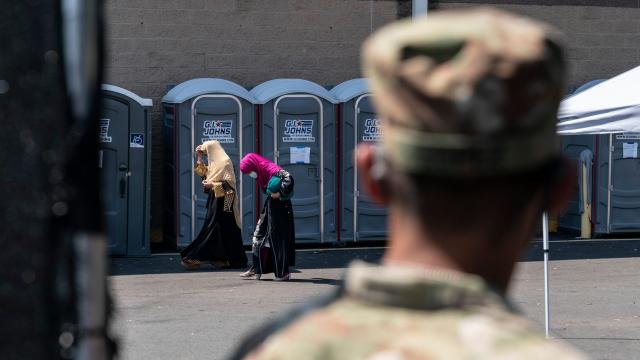Airbnb said on Tuesday it will provide free temporary accommodations to 20,000 Afghan refugees fleeing the Taliban’s virtually complete takeover of Afghanistan in the wake of U.S. military withdrawal, with the program beginning immediately.
CEO Brian Chesky tweeted early Tuesday that the company “will begin housing 20,000 Afghan refugees globally for free,” adding that while the company will be paying for the stays, “we could not do this without the generosity of our Hosts.” Chesky added: “The displacement and resettlement of Afghan refugees in the US and elsewhere is one of the biggest humanitarian crises of our time. We feel a responsibility to step up.”
In a statement, Airbnb said that that it and Chesky would be covering costs through the non-profit 501(c)(3) Airbnb.org, which has previously provided housing for disaster victims and health workers during the novel coronavirus pandemic. The organisation will also be soliciting donations for its Refugee Fund. It is working with resettlement agencies and other partners to identify those in need of housing. The company added that it “urges fellow members of the global business community to join efforts to provide immediate support to Afghan refugees.”
Reached by email, Airbnb did not say how long it would be providing the housing or covering bills. However, the company wrote in the statement it has already provided 165 refugees from Afghanistan “safe housing shortly after touching down in the U.S.” over the last weekend.
The Taliban, an ultra-reactionary Islamic militant group originally backed by the CIA and Pakistan’s Inter-Services Intelligence agency to fight the Soviets during the Cold War, controlled Afghanistan from 1996 to 2001, when they were deposed by the U.S. in the wake of the Sept. 11, 2001 terror attacks for providing safe haven to the Al-Qaeda terror network. But it was never even close to being destroyed and continued to fight both the U.S.-led coalition occupying the country and security forces commanded by the U.S.-backed Afghan government. President Joe Biden’s administration, having promised to bring an end to the seemingly never-ending U.S. occupation of the country, has so far chosen to abide by a deal struck with the Taliban under Donald Trump’s administration to pull out all U.S. troops (though it extended the timeline to the end of August 2021). Despite assurances to the contrary from Biden’s administration, the Afghan government put up little resistance and effectively ceased to exist beyond isolated groups of holdouts as Taliban forces consolidated control in mere weeks.
The 20 disastrous years of U.S. occupation stretched across four presidential administrations, caused hundreds of thousands of deaths and untold economic and social damage. And according to United Nations estimates, ended with just short of 2.5 million registered Afghan refugees. The only part of Afghanistan where U.S. military forces remain stationed is the airport in Kabul, where tens of thousands of refugees desperate to avoid retribution and/or oppression by the resurgent Taliban have fled in recent weeks in a last-ditch effort to board the last planes leaving the country.
The Taliban have since announced that while they will let foreign nationals leave, they will not allow Afghan citizens to reach the airport, and they oppose any continued evacuations beyond Aug. 31. Witnesses have described the militant group’s crackdown on dissent and reprisals against those suspected of assisting U.S. or NATO forces during the occupation. On Tuesday, according to CNBC, the Biden administration said it had evacuated or helped evacuate some 58,700 people from Afghanistan since Aug. 14, including about 21,600 airlifted since Monday. According to the Washington Post, Biden told G-7 leaders on Tuesday that he believes the evacuation will be completed by the Aug. 31 deadline. While he is not expected to announce an extension, the White House left open the possibility that the final withdrawal date could change if necessary.
Many of the refugees are currently in squalid conditions, such as in hangars at Doha, Qatar’s Al Udeid Air Base, where thousands are reportedly being held in searing August temperatures without air conditioning and a dire lack of resources. Axios obtained an email, sent last Friday by U.S. Central Command supervisory special agent Colin Sullivan, detailing conditions at the base including uncleaned human waste and a rat infestation. Sullivan wrote, “While not in any way downplaying the conditions in Kabul nor the conditions the Afghanis [sic] are escaping from, the current conditions in Doha are of our own doing.”
Airbnb said in the statement that Airbnb.org has provided accommodation to roughly 75,000 people in need since 2012. Chesky tweeted, “I hope this inspires other business leaders to do the same. There’s no time to waste.”
The company, which operated in Afghanistan during the U.S. occupation and still has a small number of listing there as of Tuesday afternoon, isn’t the only one offering to help during the crisis (and implicitly pick up some PR goodwill in the process). According to Reuters, Verizon Inc. has announced plans to waive charges for calls to Afghanistan through Sept. 6, while Walmart is donating $US1 ($1) million to nonprofits to support Afghan refugees. The Pentagon said this weekend that it has enlisted 18 aircraft from United Airlines, American Airlines, Delta Airlines, and others to take displaced persons to their next destinations after disembarking from flights leaving Afghanistan, Reuters added.
